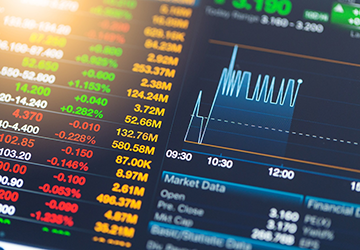Impact of Global Events on Financial Markets
Global events significantly impact financial markets, influencing investor behaviour, market sentiment, and economic stability. Because financial markets are based on information and expectations, they are, by nature, responsive to events worldwide. An unforeseen event often upsets the status quo, causing volatility as investors rush to reevaluate their plans.

Several factors, including social movements, economic trends, and geopolitical events, influence financial markets. As a result, investors and anyone else pursuing financial stability must comprehend the possible ramifications of these global events affecting markets; this aids in contextualizing market movements and providing investors with a broader understanding of the reasons behind the cyclical fluctuations in their investments.
Here are some key global events and their potential effects on financial markets:
1. Geopolitical Events
Wars and Conflicts: These often lead to increased market volatility, a flight to safety (e.g., gold, U.S. Treasuries), and disruptions in commodity markets, particularly oil and gas.
Terrorist Attacks: Similar to wars, these events can cause immediate market sell-offs and heightened uncertainty, affecting sectors like travel, shipping, insurance, and defence.
Political Instability: Changes in government, coups, and political turmoil can lead to broad market uncertainty, affecting currency values and investor confidence.
2. Economic Events
Recessions and Economic Crises: These factors can lead to significant market downturns, reduced consumer confidence, and lower corporate earnings. Examples include the 2008 Financial Crisis and the Eurozone Debt Crisis.
Monetary Policy Changes: Central bank actions, such as interest rate changes and quantitative easing, directly affect bond yields, stock prices, and currency values.
Trade Policies and Tariffs: Trade wars and tariffs can disrupt global supply chains, affecting stock markets, particularly in sectors reliant on international trade.
3. Natural Disasters and Pandemics
Natural Disasters: Events like hurricanes, earthquakes, and tsunamis can cause immediate economic damage, affecting insurance companies, infrastructure stocks, and regional economies.
Pandemics: The COVID-19 pandemic is a prime example, causing widespread economic shutdowns, unprecedented government stimulus, shifts in consumer behaviour, and volatility in financial markets.
4. Technological Advances
Cybersecurity Threats: Major cyber-attacks can disrupt markets, mainly if they target critical financial infrastructure or significant corporations.
Innovations: Breakthroughs in technology can drive growth in specific sectors, such as the tech boom of the late 1990s or the rise of renewable energy technologies.
5. Environmental and Climate Events
Climate Change: Increasing awareness and regulatory changes related to climate change can influence investment strategies, particularly towards sustainable and ESG (Environmental, Social, Governance) investments.
Environmental Regulations: New policies to reduce carbon emissions can impact industries like fossil fuels, automotive, and manufacturing.
6. Social and Cultural Shifts
Demographic Changes: Aging populations in developed countries can affect pension systems, healthcare demand, and labour markets.
Social Movements: Movements advocating for social justice, equality, and environmental sustainability can influence corporate practices and investor preferences.
7. Globalization and Supply Chain Issues
Global Supply Chains: Disruptions due to geopolitical tensions, pandemics, or natural disasters can affect international supply chains, impacting production and market prices.
Trade Agreements: The formation or dissolution of trade agreements can affect global trade dynamics, thus impacting various sectors.
Case Studies and Historical Events: Financial Markets and Global Events
Examining specific historical case studies can significantly enrich our understanding of the impact of global events on financial markets and, in turn, market reactions to international events. These events highlight how interconnected our world is and how financial markets respond to various global disruptions.
The 2008 Financial Crisis
The 2008 financial crisis, triggered by the collapse of the housing bubble in the United States, is one of modern history's most significant economic events. The widespread use of complex financial instruments, like mortgage-backed securities and collateralized debt obligations, exacerbated the situation.

Market Impact:
Stock Markets: Major indices like the S&P 500 and Dow Jones Industrial Average plummeted by over 50% from their peaks.
Credit Markets: The credit freeze led to a significant increase in borrowing costs and reduced available credit.
Global Recession: The crisis resulted in a worldwide recession, with economies worldwide contracting, unemployment rates soaring, and governments implementing massive stimulus packages to stabilize their economies.
COVID-19 Pandemic (2020)
The COVID-19 pandemic, a global health crisis, led to widespread lockdowns, travel restrictions, and a significant slowdown in economic activity.
Market Impact:
Stock Markets: The initial reaction was a sharp decline, with significant indices dropping by around 30% in March 2020. However, unprecedented fiscal and monetary stimulus measures led to a rapid recovery.
Sectors: The travel, hospitality, and retail sectors were severely impacted, while the technology and healthcare sectors saw significant gains as remote work and health concerns became prevalent.
Commodity Prices: Oil prices briefly turned negative for the first time in history due to a collapse in demand and oversupply.
Brexit (2016)
The United Kingdom's referendum to leave the European Union, known as Brexit, created significant uncertainty about the future of trade, regulations, and economic relationships between the U.K. and the E.U.
Market Impact:
Currencies: The British Pound fell sharply against the U.S. Dollar and other major currencies, reflecting concerns about the U.K.'s economic prospects.
Stock Markets: UK-focused stocks and sectors reliant on European trade experienced volatility and decline, while multinational companies with diverse revenue streams showed resilience.
Investment: The uncertainty led to a decline in business investment in the U.K., affecting economic growth prospects.
Gulf War (1990-1991)
The Gulf War, triggered by Iraq's invasion of Kuwait, had significant geopolitical and economic ramifications, particularly for oil markets.
Market Impact:
Oil Prices: Oil prices more than doubled in the lead-up to the conflict, reflecting fears of supply disruptions in the Middle East.
Stock Markets: The uncertainty and potential for prolonged conflict led to heightened volatility in global stock markets.
Commodities: Safe-haven assets like gold saw increased demand as investors sought to protect their wealth from geopolitical risks.
Japanese Tsunami and Fukushima Disaster (2011)
The earthquake and tsunami in Japan in 2011 led to a nuclear disaster at the Fukushima Daiichi Plant, causing widespread devastation and economic disruption.
Market Impact:
Stock Markets: The Nikkei 225 fell by over 10% in the days following the disaster as investors assessed the economic impact.
Global Supply Chains: Disruptions in Japan, a key player in global supply chains, affected industries worldwide, particularly automotive and electronics.
Insurance: The disaster led to significant claims for insurance and reinsurance companies, impacting their stock prices and financial stability.
Terrorist Attacks on September 11, 2001
The terrorist attacks on September 11, 2001, were a profound shock to the United States and the world, leading to immediate and long-term impacts on various aspects of life, including financial markets.
Market Impact:
Stock Markets: U.S. stock markets were closed for several days. Upon reopening, the Dow Jones Industrial Average fell by over 7% daily, and the broader markets saw a significant decline.
Insurance and Aviation: Insurance companies faced substantial claims, and the aviation sector experienced a severe downturn due to heightened security concerns and reduced travel.
Economic Policy: The attacks led to increased government spending on security and defence, changes in monetary policy, and a focus on financial recovery.
Final Thoughts on Financial Markets and Global Events
Global events can have immediate and long-term effects on financial markets. Investors often need to stay informed and agile, adjusting their strategies to navigate these events' complexities and uncertainties. Diversification, risk management, and understanding market trends are essential for mitigating the impacts of global events on investment portfolios.





